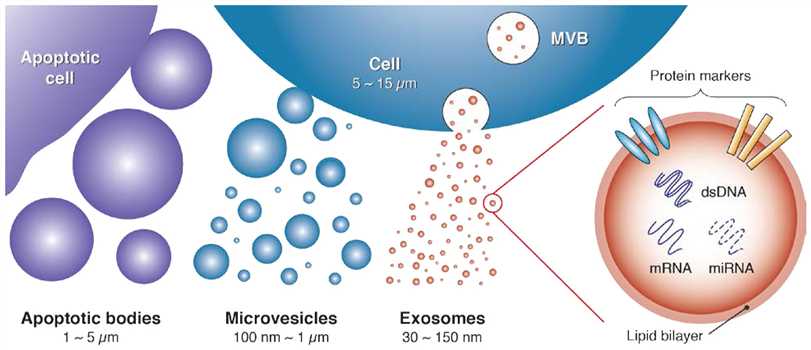Exosomes have the potential to contain individualized information related to disease state, therapeutic response, exposure to environmental cues, and a myriad of other health factors. With all these messages contained in a vesicular package that can be collected from bodily fluid samples, exosomes have generated considerable excitement as a pathway to enable personalized medicine. As a biotechnology company pursuing the frontier of science, Creative Biolabs has an advanced technology platform and we are capable of providing high-quality exosome detection services to global customers.
Exosomes are small (30-150nm) membrane-bound particles that originate from large multivesicular bodies (MVBs) and are released into the extracellular environment by fusion of MVBs with the plasma membrane, and they have been revealed as a promising biomarker in multiple diseases. Exosomes can also be released in large quantities in various biological fluids, such as plasma, urine, saliva, ascites, and bronchoalveolar lavage fluid. A number of cell types have been described as releasing exosomes, such as epithelial cells, hematopoietic cells, neuronal cells, fibroblasts, adipocytes, and tumor cells. Although the size of exosomes is similar between normal and malignant cells, the exosome protein concentration is higher in advanced-stage cancer, and the protein, mRNA, and miRNA profiles of exosomes also differ from those of exosomes cells of origin. These specific exosomes can alter the microenvironment through their protein and RNA cargo. Thus, in light of their crucial role in cell-cell communication and tumor-specific content, exosomes represent a promising biomarker for early tumor detection and monitoring and medication planning.
 Fig.1 Exosomes represent a subset of extracellular vesicles with characteristic size in the 30-150nm range. (Contreras-Naranjo, 2017)
Fig.1 Exosomes represent a subset of extracellular vesicles with characteristic size in the 30-150nm range. (Contreras-Naranjo, 2017)
The isolation of exosomes ideally not only yields large quantities of purified exosomes but also facilitates analysis, such as analysis of the proteins, DNA, and miRNA in exosomes.
Conventional methods of exosome isolation are based on a series of centrifugation steps to exclude cells and cell debris. In addition, exosomes can be isolated via ultrafiltration plus size exclusion chromatography, precipitation with polymers, and immunoaffinity purification using magnetic beads. Each method has advantages and drawbacks. For example, UC-SEC uses a solid matrix to isolate highly purified exosomes but it is difficult to remove contaminating proteins. Polymeric precipitation functions by capturing exosomes of a certain size (60-150nm) in 30 min and yields more exosomes than ultracentrifugation; however, it cannot avoid mixing of non-exosomal contents with a similar size, such as apoptotic debris or other types of microvesicles. Exosomes can also be isolated using an immunoaffinity method to selectively isolate classic CD9+, CD63+, or CD81+ exosomes, with the captured exosomes retaining bioactivity for downstream analysis. The immunoaffinity method can only be applied to a small-volume sample and only isolates exosomes with specific markers, which may limit the experimental findings.
Exosomes are rich in RNA transcripts; thus, following isolation and validation via electron microscopy, the RNA contents of exosomes can be analyzed using qPCR and NGS. In addition to RNA, several types of protein have been reported to play important roles in cell-cell communication. Using proteomic techniques, such as mass spectrometry, researchers identified that a cell surface proteoglycan, glypican-1 (GPC1), could be applied as an exosome marker in breast cancer and pancreatic cancer patients.
Committed to the research of liquid biopsy over years, Creative Biolabs has step-by-step equipped our platform with advanced facilities, the latest technologies, and professional experts. With a comprehensive platform, we are confident in offering reliable exosome detection services to global researchers. In addition, our team of Ph.D. level scientists will help to deal with every problem during the projects to assure the quality of our services.
As an industry-leading biotechnology company, Creative Biolabs has strong foundations and mature technologies. We aspire to bring top-rated customer experiences to every client and we are doing so. If you are interested in exosome detection services or you have any other questions about our services, please don't hesitate to contact us for more information.
Reference
For Research Use Only.
